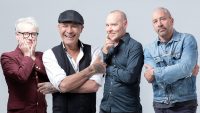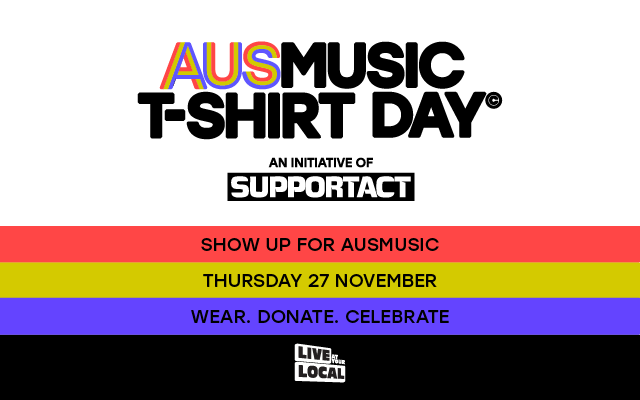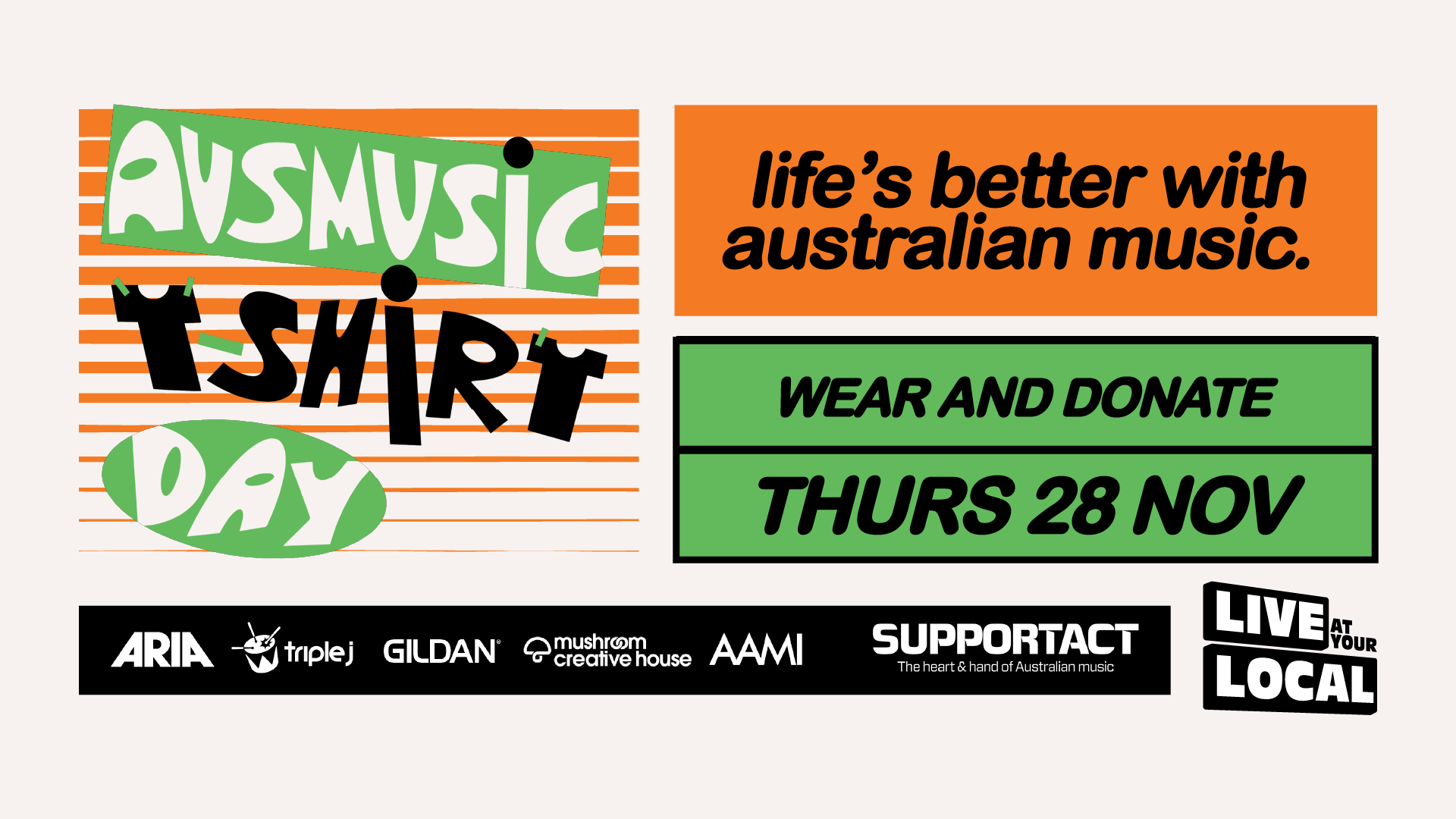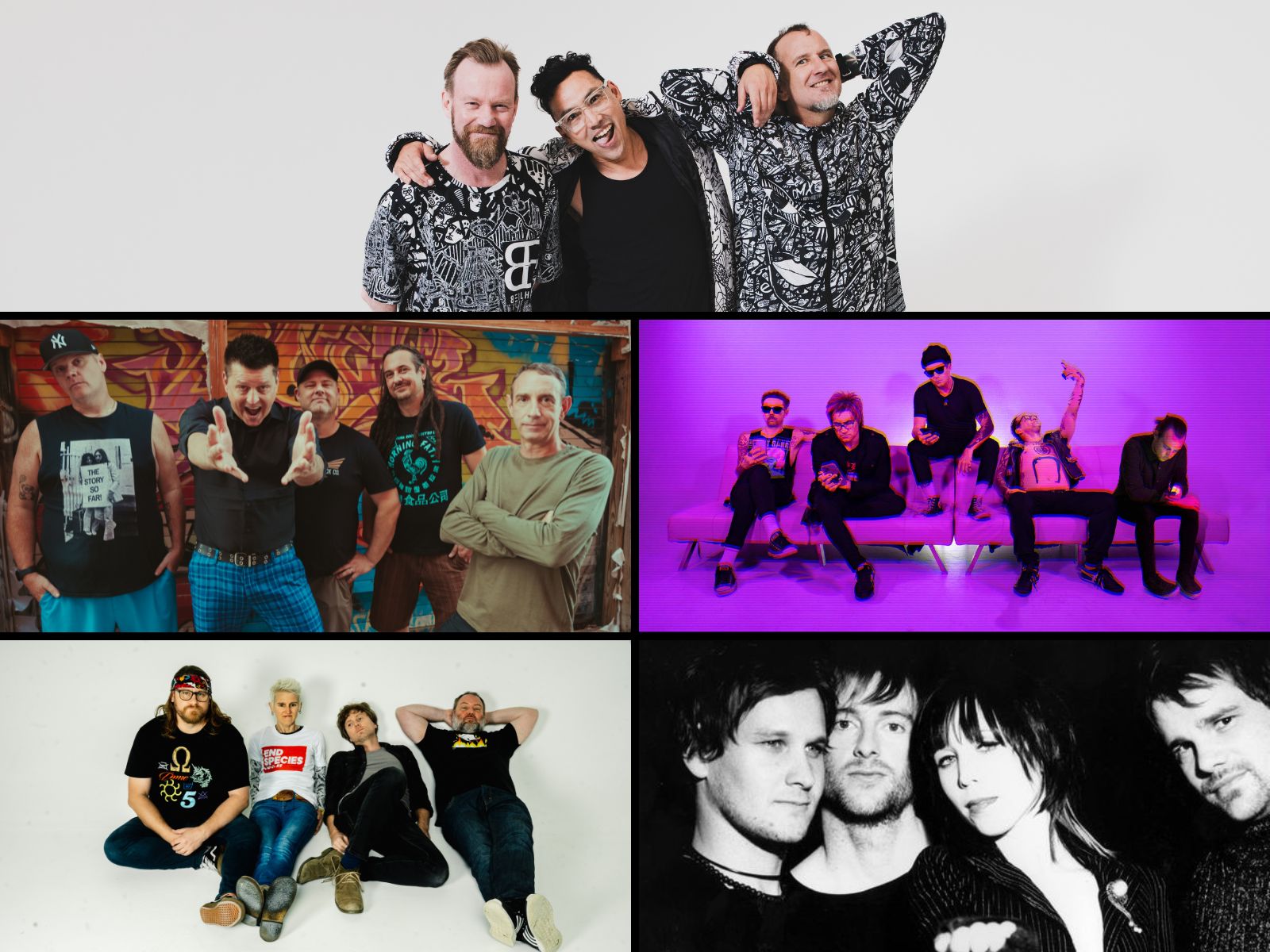
After a lengthy hiatus, Boom Crash Opera – Dale Ryder, Peter Farnan, Peter ‘Maz’ Maslen and John Favaro – are back in super-fine form and ready to rock a venue near you. Bryget Chrisfield checks in with Peter ‘Maz’ Maslen to discuss the band’s formative years of DIY promo (pole posters, strategic flyering), how he sneakily secured “more air time” on Countdown, why Stateside success eluded BCO, his impressive brushes with fame and so much more.
Boom Crash Opera origin story
“I was in my early 20s and I was just trying to find what it is I was going to do. I was playing with all sorts of different acts and on the side I was playing in a cover band to make money so that I could finance what I was going to do. So I was playing in a reggae band, a jazz band and I was playing with this fusion band – this odd-timing band – with a lot of people in it. It was all this jazz-rock stuff – it was horrible, really – and it was a band that never actually performed, we just rehearsed. But Richard Pleasance [a founding member of Boom Crash Opera] was one of the guitar players in the band, and he pulled me aside and he said, ‘Do you like this stuff?’ And I said, ‘Oh, yeah, it’s alright. Why?’ And he said, ‘Well, I’ve been writing songs with Peter Farnan, the guy from Serious Young Insects, and we wanna get on Countdown, basically. We just wanna do a commercial band. Can we come over and play you some songs?’ And I said, ‘Yeah, no worries.’ So they did and the songs that they had written, just on a four-track cassette recorder, were amazing. I thought, ‘I’ve gotta do this. This is what I wanna do.’ And I said, ‘Do you know any lead singers?’
“Now at the time Dale Ryder was the lead singer of this covers band that I was in. And it took me a few weeks, ‘cause I didn’t think Dale would wanna give up his cushy little paid gig to go and do an original band – you know, you’re paying to pay, basically. But eventually on a drive to Canberra, I sorta said, ‘Dale, I’m with these guys. Have a listen to what they’re doing.’ And he went, ‘This is fantastic!’ And I said, ‘Do you want to get involved?’ He said, ‘Yep, count me in.’ So that’s how we got Dale.”
Coming up on the scene in the Golden Age live music
“I remember stories about Jo Jo Zep And The Falcons, ‘cause they were way before us but they were selling out pubs before they’d even had a song on the radio, because it’s just what you did: you went out and you saw a band.
“All you did, culturally, was you drank and you went to a pub to see a band. I reckon that was de rigueur at the time, ‘cause there were bands on every night of the week around Australia – not just in Melbourne.
“And that’s what happened from Boom Crash Opera’s time, which is mid-‘80s through to – well, I dunno when it changed, maybe ten years later? It might have started with the advent of more discos, certain drugs and DJs. So people were popping pills and going ‘doof, doof’ – I’m not sure exactly [laughs].
“Bands like us, we cut our teeth just playing live. So you’d be doing five to six shows a week, and usually driving between cities, and then that went on week after week. Endless shows all the time, around the country; it felt like months before you’d get some sorta break. And I think youth is wasted on the young, of course. I do two shows now, on a weekend, and I’m stuffed on a Monday when I get home. I just can’t move! I sit or lie on the couch for the day.”
DIY promo: pole posters and strategic flyering
“I’ll just use Boom Crash as an example, because it’s my only reference. In ‘85 when we were breaking out into the Melbourne scene, we’d spend 400 dollars on pole posters – I think that’s correct – which was a lot of money for us back then and we’d put them up ourselves. And people would just kinda go, ‘Who are these guys? We’ll go!’ And we had a packed house at our first show, 400 people at The Tiger Lounge in Bridge Road.
“You know, someone big, Painters And Dockers would be playing at the Tropicana in Richmond so we’d all get a bunch of flyers and put them under people’s windscreen wipers – you had to do it yourself. It was all very local, though, so only people around the inner city of Melbourne really knew who we were.
“So then you had to go, ‘Well now we have to go to Sydney and do the same sorta thing.’ And we did that, too – well, we didn’t put flyers under windscreen wipers, but we did pole posters. And you’ve gotta remember that, culturally, that’s what everybody did: ‘Oh, who are these guys from Melbourne? Let’s go see them.’ So at our first show in Sydney – it was packed! Mainly because that’s what people did, they took an interest in – well people of our age, at the time, that’s what you did.”
“The Tarago diaries”
“We all used to hang out at this breakfast place called The Clever Zebra in the top end of Fitzroy Street [St Kilda, Melbourne] back in the mid ‘80s and Mark Seymour and I referred to it as ‘the Tarago diaries’ because we always used to tour in Taragos, hire out Taragos, right?
“On a Monday, anywhere through to mid-week, all the bands would just go there and have breakfast. Even the bands from Sydney who were staying around the corner in Acland Street at the Diplomat would come to The Clever Zebra, so it was just a breakfast hang and you’d talk about the weekend or past gigs: how they went, the people you met, incidents that’d happen – tell each other stories.
“I lived in Saint Kilda for 15 years and it was fantastic. And then one day we were all having ice cream down at Acland Street, as we did on a hot summer’s night, and someone noticed that a Just Jeans went in. And then everyone looked around and went, [inhales sharply] ‘It’s over!’ And then, of course, within five years everyone was gone. All those people had kinda moved on, branched out.”
On Boom Crash’s debut single going Top 5
“We were really indifferent and we didn’t really know at the time. Of course if that happened now, we’d be excited. But at the time everyone around us was going, ‘Oh, my God!’ It was number five nationally and everyone’s going off, you know, ‘You guys!’ And we’re going, ‘Really? Okay. Thank you.’ It was nice. But from that point on I guess we felt the wave starting to rise and then you just sorta jump on the top of it and it takes you in.”
Getting “more air time” on Countdown
“Countdown was all mimed, of course, and you’d do camera rehearsals in the afternoon. I think it was taped on a Friday, I can’t remember now, and you’d be looking at the screen, ‘cause all the directors upstairs would be choosing the shots and, ‘Get the camera down on the bass player,’ and, ‘Camera four do this and that,’ blah-blah-blah. And, as a drummer, I go, ‘I’m not gettin’ any screen time!’ So, alright, I started over-performing, like, putting my hands up in the air or smashing the drums – just at rehearsals – and so the next take I go, ‘Ooh, they’ve got a camera on me,’ you know? [laughs] ‘Cause I’m performing and they’re all happy upstairs.
“It’s all live to tape and, come the show at night time, I wouldn’t do any of that – I’d just play the drums, I’d play normally – and the director is probably going, ‘NOOOOOO, he’s not doing his thing!’ You know? So I’d get more air time.”
“I’ve never been a stick trick kinda guy”
“I’ve never been a stick trick kinda guy. I can’t do it. Dale Ryder said to me once, ‘You don’t look like you’re performing, like, you don’t shake your head and stuff’ – this is years ago – and there’s a good reason why: it’s because I suffer from vertigo and can’t shake my head around for that reason. So if I start shaking my head like a maniac, I’ll probably keel over beside the drum set and spew up.”
Early influences and those INXS comparisons
“It was mostly because Dale and Michael [Hutchence] were sort of similar in their stage performances in that they were, you know, slightly feminine, I s’pose, in their approach; even though it was captivating. And the music, well, we weren’t influenced by INXS; we were probably influenced by the same people. So all Boom Crash Opera wanted to be was either XTC, from England, or The Reels – we loved The Reels. And early Models. We sort of modelled ourselves off those bands before us.
“I lived in Sydney for a while and dated a woman who shared an apartment in Bondi with Wendy Matthews, they were housemates, and so that’s where I met Sean Kelly. There was one morning I woke up and Sean was at the breakfast table, you and he was looking very intimidating, you know? [laughs] And then we became best buddies and hung out together as part of that Sydney crew that I was hanging out with.”
Narrowly missing his Robert Plant “moment”
“It was a big deal going to London, recording [Boom Crash Opera’s debut self-titled record (1987)] at RAK Studios, because the producer Alex Sadkin – he did Simply Red before us and he’d done Grace Jones and Robbie Neville – he knew everybody and everybody knew him, he was a famous producer. He was an American living in London and get this! The one time that I’d done all my drums – we were staying around the corner in St. John’s Wood, not far [from RAK Studios]. So after dinner I said, ‘Guys, I’m going home. I’ll see you tomorrow morning or whatever, I’m going back to the apartments’ – we had two apartments. And they said, ‘Yeah, cool. See you. Whatever.’
“And so the next morning I wake up and they go, ‘Oh, you shouldn’t have gone.’ ‘Why?’ ‘Guess who crashed the session?’ And I went, ‘Well, I have no idea. Who?’ They said, ‘Robert Plant.’ I said, ‘What!?’ Robert Plant, who knew Alex Sadkin, just came into the studio and hung out! They could’ve called, but they were probably in the moment; they probably just didn’t wanna walk to a telephone, because they were having their moment with Robert.”
Why success in the U.S. eluded Boom Crash
“Boom Crash never really got a break overseas. We did in America for a bit and we had our hopes high, we’d just signed to a new recording label with Irving Azoff, who [founded] Giant Records [a joint venture with Warner Bros. Records] at the time. We were with Warner’s and Onion Skin was, like, number five on the Billboard college chart. And at the beginning of MTV, Onion Skin was getting played, like, 15 times a week or something, which was an outrageous amount: it was the highest rotation you could get. So we actually had some profile in the United States. And we were just about to go on tour and the rug was pulled. And it got political, obviously, but they didn’t wanna spend the money necessary until we crossed over into – what’s it called? CHR: Contemporary Hit Radio?
“And we didn’t cross over, because Giant Records just didn’t have the staff or any of that to really see it through. They were fledgling, and so they weren’t prepared for it all, and it just all went away and we were very disappointed about that. We suffered internally from that – all of us individually and together – for a long time. Well, you know, you really just get one crack at the title and that was the time when it should’ve happened for us.”
Stranded in LA: how the Rodney King riots inspired a song
“We were in LA during the riots making that Fabulous Beast record and we all kinda wanted to go home, but we knew we couldn’t. What started the riots was the Rodney King verdict being handed down. The cops got off and then, that day, we watched the blond truck driver – Reginald Denny, his name was – getting beat up on the corner of Normandie and Florence [avenues] down in South-Central; live helicopter shots and everything. And we were in the studio in the Valley miles away, but we were watching it live and we couldn’t believe it. It was just, ‘Wow.’
“And then that night, it completely escalated into – well, the place was on fire. A bunch of Aussies – we’d never heard that much gun fire. We were staying in the safety of the Hollywood Hills, but I remember hearing a machine gun and I’d never heard a machine gun in my life! And so the government put in a curfew, you weren’t allowed out between sundown and sun-up; you had to have a very good reason. The army was moved in and we thought, ‘How can we get outta here?’ Well, we couldn’t, you know? People were firing guns at planes in LAX.
“Anyway, we had an American friend take us up to Big Bear – which is about four hours drive east of Los Angeles, up in the mountains – and we stayed there for a few days to get away. We wanted to leave, but we knew we couldn’t. And then I think it was during the end of that period Spock [Greg O’Connor], the keyboard player, sorta came up with the idea of, ‘This is the last place I wanna be in at the moment’. And [O’Connor] and Pete [Farnan, guitarist] just sat around one night writing it [Boom Crash’s song, The Last Place On Earth] and that was it! And we just recorded it, the way it was. It summed up the feeling at the time.”
Eavesdropping on Barry White in a lunch cart queue
“We were recording in Los Angeles at A&M studios: it was the studios and the record company at this massive complex in La Brea Avenue, so the record company and the studio people are all intertwined and mixed in. So at 11 o’clock the lunch cart comes around, right? And everyone just comes out and gets their burritos and their sandwiches and their milkshakes and whatever, and then they go back to work. I was standing in the line, right? And there’s this African American couple in front of me, chewing the fat about something – I’m inattentive, I’m not listening; just soaking up the warm sunny day in the line. But then I looked down at this guy’s shoes and they were patent leather and I’m like, ‘Wow!’ And I looked up and immediately went, ‘Wow, this guy must be wearing $5,000 worth of clothes or something,’ you know?
“Then I tuned into the conversation and, you know, he had a [impersonates Barry White] deep voice like that, and I went, ‘Oh! Oh! Oh! I’m standing in a line waiting for my burrito behind Barry White!’ – pre-mobile phones, of course. ‘Cause Barry White used to work for A&M Records in the A&R area, you know? So they’re talkin’ about someone’s record and I’m so focused in on the conversation right now [laughs] and Barry goes, in his big, deep voice, ‘You know what? That record – it didn’t sell that many copies.’ And this woman takes great offence, steps back and says, ‘Well, it sold more than the Barry White CD!’
“That’s my only Barry White anecdote I’ve got for you today. I just couldn’t believe it, you know? Of all the people! I’m just going, ‘That’s Barry White!’”
Sharing oxygen with Charlie Watts
“I’ve become a voyeur now, like, I was in a studio in London – it wasn’t even that long ago – and over in the corner was Charlie Watts! Sitting by himself, you know? I just wanted to text somebody. ‘Cause some of the big complexes over there, they’ve got cafés in the middle. And Charlie’s obviously waiting on someone and he’s sitting around with his patent leather shoes on and his Savile Row suit. He’s looking like he’s wearing £10,000 worth of clothes, and just sitting there dapper as all get-out, and I’m like, ‘Oh, I just wanna say something to you, but…’ You shared oxygen though, right? “I shared oxygen with Charlie Watts! [laughs].”
“The album that never got released”
“I like stuff from Born Again, the album that’s never been released – I’d like to re-record all that stuff… Someone’s doing a documentary on us about that: Born Again, the album that never got released [laughs]… We own our recordings, but we lease them to Liberation/Mushroom Records. Maybe we’ll talk about that [releasing this unreleased album]. It’s a possibility. It might be up to the record company.”
Longevity secret
“The one thing I’d say about our band is that we’ve been together for a long time and I think it’s because, if you melted it all down, we probably like each other. You know, like a family, your siblings – you kinda have fights with your brothers or sisters and whatever, but at the end of the day they’re your blood and you can get past a lot of that stuff. We do, we bury it. You’ve just gotta like each other.”


